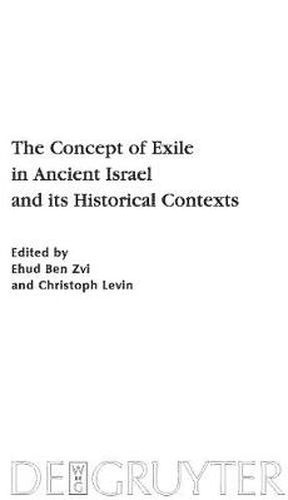Readings Newsletter
Become a Readings Member to make your shopping experience even easier.
Sign in or sign up for free!
You’re not far away from qualifying for FREE standard shipping within Australia
You’ve qualified for FREE standard shipping within Australia
The cart is loading…






In ancient Israelite literature Exile is seen as a central turning point within the course of the history of Israel. In these texts the Exile is a central ideological concept. It serves to explain the destruction of the monarchic polities and the social and economic disasters associated with them in terms that YHWH punished Israel/Judah for having abandoned his ways. As it develops an image of an unjust Israel, it creates one of a just deity. But YHWH is not only imagined as just, but also as loving and forgiving, for the exile is presented as a transitory state: Exile is deeply intertwined with its discursive counterpart, the certain Return . As the Exile comes to be understood as a necessary purification or preparation for a renewal of YHWH’s proper relationship with Israel, the seemingly unpleasant Exilic conditions begin, discursively, to shape an image of YHWH as loving Israel and teaching it. Exile is dystopia, but one that carries in itself all the seeds of utopia. The concept of Exile continued to exercise an important influence in the discourses of Israel in the Second Temple period, and was eventually influential in the production of eschatological visions.
$9.00 standard shipping within Australia
FREE standard shipping within Australia for orders over $100.00
Express & International shipping calculated at checkout
In ancient Israelite literature Exile is seen as a central turning point within the course of the history of Israel. In these texts the Exile is a central ideological concept. It serves to explain the destruction of the monarchic polities and the social and economic disasters associated with them in terms that YHWH punished Israel/Judah for having abandoned his ways. As it develops an image of an unjust Israel, it creates one of a just deity. But YHWH is not only imagined as just, but also as loving and forgiving, for the exile is presented as a transitory state: Exile is deeply intertwined with its discursive counterpart, the certain Return . As the Exile comes to be understood as a necessary purification or preparation for a renewal of YHWH’s proper relationship with Israel, the seemingly unpleasant Exilic conditions begin, discursively, to shape an image of YHWH as loving Israel and teaching it. Exile is dystopia, but one that carries in itself all the seeds of utopia. The concept of Exile continued to exercise an important influence in the discourses of Israel in the Second Temple period, and was eventually influential in the production of eschatological visions.